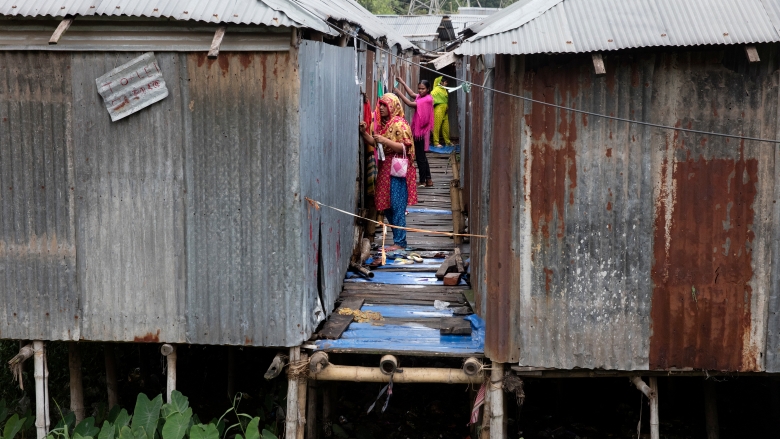Slums and informal settlements are emerging hotspots for coronavirus (COVID-19) transmission. Living conditions in slums—home to more than a billion people worldwide—are often substandard and overcrowded, lacking adequate access to public services. Simple preventive measures like social distancing and handwashing are luxuries here. In times of crisis, the economic impact is also far more devastating for slum dwellers, who often live from hand to mouth.
The challenges facing slums are not new, but during the COVID-19 pandemic they demand solutions more urgently than ever. That’s why the World Bank is working with national and subnational governments to help ensure that neighborhood upgrading, housing improvements, and other interventions are part of the response. These activities are part of an integrated and multisectoral “inclusive cities approach” to promote the spatial, social, and economic inclusion of people in informal settlements.
The World Bank has decades of experience in urban upgrading projects, and we have learned valuable lessons along the way.
1. Communities must be at the center. Community participation and ownership are critical. Take for example the National Slum Upgrading Project in Indonesia, which is encouraging local participation in slum upgrading. Among other objectives, this initiative is pairing 6,000 professionals and community workers with local and central governments to help devise, implement, and monitor investments in slums. So far, the efforts have benefited almost 4.6 million people across 6,100 wards. During the current crisis, having channels to connect with fellow residents is essential to an effective response.
2. Upgrading creates an upward spiral. Providing basic services in slums not only improves living conditions for slum dwellers, but also strengthens public health and stimulates the local economy. For example, in Afghanistan, revitalizing drains, roads, and water and waste management systems in target neighborhoods led to an overall 6.4% annual increase in private investments in land, housing, and real estate. Likewise, when we supported an initiative to upgrade neighborhood infrastructure in Vietnam’s Mekong Delta, over 350,000 beneficiaries across 144 low-income areas saw increased land value and expanded home-based business opportunities.
3. Livelihoods and jobs are key to progress. Slum dwellers are often employed in the informal sector, earning irregular incomes that by their nature are vulnerable to shocks like COVID-19. That’s why in parallel to upgrading slums we must promote economic inclusion. For example, slum upgrading projects in Indonesia and Pakistan are working to improve marketplaces and kiosks for street vendors. In Buenos Aires’ Barrio 31 neighborhood, among other efforts, the World Bank is supporting an entrepreneurship center that’s helping formalize 900 informal businesses. Meanwhile, slum upgrading efforts in Djibouti and elsewhere are increasingly supporting local employment opportunities through labor-intensive works.
4. Securing tenure through planning. Secure land tenure incentivizes households to improve their homes and neighborhoods. It helps protect slum dwellers against forced eviction, especially during uncertain times. In Kenya, the World Bank is helping strengthen the security of tenure in about 80 informal settlements by supporting settlement planning, surveys, registry index maps, and letters of allotment and titles. Tenure regularization and on-site settlement upgrading were made possible by easing regulations to allow for non-standard plot sizes and road widths, preserving the original layout of the upgraded settlement.
5. Public spaces transform neighborhoods. Well-designed public spaces in informal settlements can promote local business growth, increase public safety, and improve aesthetics. For example, in Karachi, Pakistan, we’re helping the local government develop attractive public spaces that residents can enjoy and vendors can use to build their livelihoods. Meanwhile, in Jamaica, high-mast lighting and other upgrades are illuminating public spaces and making neighborhoods safer. In the COVID-19 era, improved public spaces can also help ease overcrowding, promote healthier lifestyles, and serve as makeshift shelters or markets.
6. High tech is aiding development in slums. Insufficient data has traditionally hindered adequate planning for assistance to slums. But today, thanks to technological advancements, evidence-based decision making and real-time monitoring for slums are becoming easier and faster. For example, with World Bank support, the Republic of Congo is using drones and geographic information systems to develop highly detailed neighborhood risk and resilience plans. During the current crisis, technology has also been useful for geolocating potential outbreaks and conveying critical information to at-risk populations.
The global pandemic is shedding light on slums and the dire living conditions of those who call them home. At the same time, it is providing an unprecedented opportunity to make cities more inclusive and resilient, helping them not only survive the health crisis, but thrive in the world that comes afterward.
The time for change is now. But change in urban settings goes beyond providing adequate housing and services in slums. We must also work together to improve access to education, public health, safety, and economic opportunity for all.
Click here to read slum upgrading case studies in nine countries. These knowledge products were co-developed by in-country experts, the Knowledge Silo Breaker on Urban Poverty, and the Slum Upgrading and the Global Solution Group on Urban Poverty and Housing.

